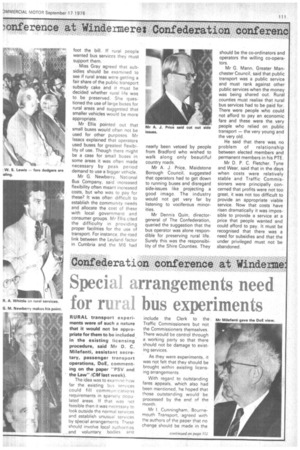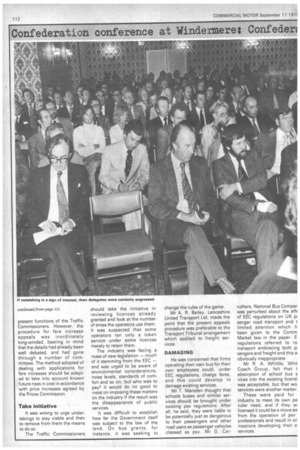pecia arrangements need for rural bus experiments RURAL transport experiments
Page 113

Page 114

If you've noticed an error in this article please click here to report it so we can fix it.
were of such a nature that it would not be appropriate for them to be included, in the existing licensing procedure, said Mr D. C. Milefanti, assistant secretary, passenger transport Operations, DoE, commenting on the paper "PSV and the Law" (CM last week).
The idea was to exarnIne now far the existing bus services could fill communications requirements in sparsely populated areas. If that was not feasible then it was necessary to look outside the normal services and establish unusual services by special arrangements These should involve local authorities and voluntary bodies aria include the Clerk to the Traffic Commissioners but not the Commissioners themselves. There would be control through a working party so that there should not be damage to existing services.
As they were experiments, it was not felt that they should be brought within existing licensing arrangements With regard to outstanding fares appeals, which also had been mentioned, he hoped that those outstanding would be processed by the end of the month.
Mr I. Cunningham, • Bournemouth Transport, agreed with the authors of the paper that no change should be made in the present functions of the Traffic Commissioners. However, the procedure for fare increase appeals was inordinately long-winded, bearing in mind that the details had already been well debated, and had gone through a number of committees. The method adopted of dealing with applications for fare increases should be adapted to take into account known future rises in cost in accordance with price increases agreed by the Prices Commission.
Take initiative
It was wrong to urge undertakings to stay viable and then to remove from them the means to do so The Traffic Commissioners should take the initiative in reviewing licences already granted and look at the number of times the operators use them. It was suspected that some operators ran only a token service under some licences merely to retain them.
The industry was facing a mass of new legislation — much of it stemming from the EEC -and was urged to be aware of environmental considerations, noise levels, standards of comfort and so on, but who was to pay? It would do no good to insist on imposing these matters, on the industry if the result was the disappearance of public services.
It was difficult to establish how far the Government itself was subject to the law of the land On bus grants, for instance, it was seeking to change the rules of the game.
Mr A. R. Bailey, Lancashire United Transport Ltd, made the point that the present appeals procedure was preferable to the Transport Tribunal arrangement which applied to freight services.
DAMAGING
He was concerned that firms operating their own bus for their own employees could, under EEC regulations, charge fares, and this could develop to damage existing services.
Mr T. Marsden thought that schools buses and similar services should be brought under existing psv regulations. After all, he said, they were liable to be potentially just as dangerous to their passengers and other road users as passenger vehicles classed as psv Mr G. Car
ruthers, National Bus Compar was perturbed about the affE of EEC regulations on UK pi senger road transport and t limited attention which h been given to the Comm Market law in the paper. E regulations referred to ro transport embracing both pi sengers and freight and this v% obviously inappropriate.
Mr R. A. Whittle, Whit Coach Group, felt that t absorption of school bus s vices into the existing licensi was acceptable, but that wa services were another matter.
These were paid for industry to meet its own pa cular need, and if they %Ail licensed it could be a move a‘n from the operation of psv professionals and result in or nisations developing their 0. services.








































































































































































































